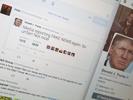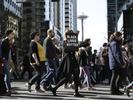Shankar Vedantam appears in the following:
Classifying Attacks: Mental Illness Or Terrorism?
Thursday, October 05, 2017
New research explores our tendency to label mass shooters as either mentally ill or as terrorists, based on whether they are Muslim or not.
The Pitfalls Of Social Media Advertising
Friday, September 29, 2017
Many companies are investing money in social media to advertise new products. But they could be paying a hidden price for those ads.
Powerful Storms Make For Compelling Stories, But Can Cause Mental Health Stress
Thursday, September 21, 2017
NPR's Kelly McEvers talks with Shankar Vedantam, host of NPR's Hidden Brain podcast about how witnessing traumatic events — even from a great distance — can affect mental health.
Examining Links Between Academic Performance And Food Stamps
Thursday, September 21, 2017
South Carolina researchers have drawn a connection between low-income students' poor performance on math tests and the time of month when their families run low on food stamps.
How The Minimum Wage Affects Restaurant Hygiene
Wednesday, September 13, 2017
An analysis of Seattle restaurants shows that as the city dramatically raised the minimum wage for restaurant employees and other workers, restaurants responded by lowering hygiene standards.
Study Looks At How People Think About Free Speech
Friday, September 08, 2017
Some new research says that many people use free speech arguments only when convenient, and as a cover for their own feelings.
You 2.0: How To Build A Better Job
Monday, July 31, 2017
Finding a new job may be the solution to your woes at work. But there may also be other ways to get more out of your daily grind.
You 2.0: The Value Of 'Deep Work' In An Age Of Distraction
Tuesday, July 25, 2017
Every time you give in to the buzzing notifications of our phone or computer, you pay a price: little by little, you lose your ability to focus.
Hidden Brain: How Cigarette Taxes Affect Food Buying
Tuesday, July 25, 2017
A new study shows a connection between cigarette taxes and food stamps. When cigarette taxes go up, smokers end up spending more of their income on cigarettes and that leaves less money for food.
Researchers Examine When People Are More Susceptible To Fake News
Tuesday, July 18, 2017
Whether people consume news in a social setting or alone can affect how likely they are to fact-check. Research suggests people let their guard down when they're in groups and become less skeptical.
Why Aren't Students Showing Up For College?
Monday, July 17, 2017
According to research, between 10 and 40% of kids who intend to go to college at high school graduation don't show up in the fall. This phenomenon, known as "summer melt," has puzzled universities.
Can Robots Teach Us What It Means To Be Human?
Monday, July 10, 2017
If you've ever shouted at Siri or rolled your eyes at your Roomba, you know that artificial intelligence isn't always that smart. But there's still a lot that robots can tell us about ourselves.
Pain Before Pleasure Makes The Pleasure Even Better, Study Finds
Monday, July 10, 2017
A study from the University of Kentucky shows that doing something virtuous can make indulging later even more pleasurable.
Research Shows Birth Order Really Does Matter
Tuesday, July 04, 2017
Compared to older siblings, second-born boys are more likely to go to prison, get suspended in school and enter juvenile delinquency. Why? Parents of first-borns are more invested in their upbringing.
Child Care Centers Often Don't Hire The Most Qualified Teachers, Study Shows
Wednesday, June 28, 2017
Child care centers don't necessarily hire the most qualified teachers. A new study shows that child care centers pick applicants who are in the middle of the pack.
Degrees of Maybe: How We Can All Make Better Predictions
Monday, June 26, 2017
Pundits and prognosticators make predictions all the time: about everything from elections, to sports, to global affairs. This week, we explore why they're often wrong, and how we can all do better.
Hidden Brain: Terror Strikes And An Attacker's Identity
Tuesday, June 20, 2017
Research shows people are more likely to label an attack as terrorism if the perpetrator is Muslim. Terrorist attacks committed by Muslims receive more coverage than those not committed by Muslims.
When Is It 'Terrorism'? How The Media Cover Attacks By Muslim Perpetrators
Monday, June 19, 2017
In the last five years, 12 percent of terrorist attacks in the U.S. were carried out by Muslims and more than 50 percent by far right extremists. So why the media focus on "Islamic terrorism"?
Police Shootings: How A Culture Of Racism Can Infect Us All
Tuesday, June 13, 2017
In a shooting involving a police officer, there's often a familiar blame game: Was the cop was racist? Was the person shot threatening? Or maybe, the bias that leads cops to shoot affects us all.
Rap on Trial: How An Aspiring Musician's Words Led To Prison Time
Monday, June 12, 2017
Olutosin Oduwole was a college student and aspiring rapper when he was charged with "attempting to make a terrorist threat." We explore how perceptions of rap music may have played a role.
















